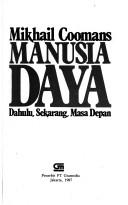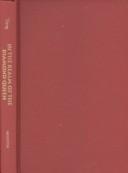| Listing 1 - 10 of 12 | << page >> |
Sort by
|

ISBN: 9794031569 Year: 1987 Publisher: Jakarta Penerbit PT Gramedia
Abstract | Keywords | Export | Availability | Bookmark
 Loading...
Loading...Choose an application
- Reference Manager
- EndNote
- RefWorks (Direct export to RefWorks)
Book
ISBN: 1782385657 Year: 2015 Publisher: New York, [New York] ; Oxford, [England] : Berghahn,
Abstract | Keywords | Export | Availability | Bookmark
 Loading...
Loading...Choose an application
- Reference Manager
- EndNote
- RefWorks (Direct export to RefWorks)
"Belianis an exceptionally lively tradition of shamanistic curing rituals performed by the Luangans, a politically marginalized population of Indonesian Borneo. This volume explores the significance of these rituals in practice and asks what belian rituals do - socially, politically, and existentially - for particular people in particular circumstances. Departing from the conception that rituals exist as ethereal, liminal or insulated traditional domains, this volume demonstrates the importance of understanding rituals as emergent within their specific historical and social settings. It offers an analysis of a number of concrete ritual performances, exemplifying a diversity of ritual genres, stylistic modalities and sensual ambiences, from low-key, habitual affairs to drawn-out, crowd-seizing community rituals and innovative, montage-like cultural experiments"--
Dayak (Indonesian people) --- Healing --- Traditional medicine --- Ethnology --- Rites and ceremonies.
Book
ISBN: 9789054500124 Year: 2012 Publisher: Leiden Museum Volkenkunde
Abstract | Keywords | Export | Availability | Bookmark
 Loading...
Loading...Choose an application
- Reference Manager
- EndNote
- RefWorks (Direct export to RefWorks)
Dayak (Indonesian people) --- Dayak (Indonesian people) --- Ngaju (Indonesian people) --- Ngaju (Indonesian people) --- Material culture --- Social life and customs --- Material culture --- Social life and customs --- Klokke, A. H. --- Travel --- Museum Volkenkunde (Leiden, Netherlands) --- Ethnological collections.
Book
ISBN: 0299225801 0299225844 Year: 2008 Publisher: Madison (Wis.) : University of Wisconsin Press,
Abstract | Keywords | Export | Availability | Bookmark
 Loading...
Loading...Choose an application
- Reference Manager
- EndNote
- RefWorks (Direct export to RefWorks)
Dayak (Indonesian people) --- Ethnic conflict --- Ethnic relations --- Madurese (Indonesian people) --- Riots --- Kalimantan Barat (Indonesia) --- Politics and government.
Book
ISBN: 9067652385 9789067652384 Year: 1988 Publisher: Dordrecht, Holland Providence, U.S.A. Foris Publications
Abstract | Keywords | Export | Availability | Bookmark
 Loading...
Loading...Choose an application
- Reference Manager
- EndNote
- RefWorks (Direct export to RefWorks)
Dayak (Bornean people) --- Dajak (Bornean people) --- Daya (Bornean people) --- Dayak (Indonesian people) --- Dayuh (Bornean people) --- Dyak (Bornean people) --- Dyaks --- Orang Ulu (Bornean people) --- Ethnology --- History --- Kalimantan (Indonesia) --- Dutch Borneo (Indonesia) --- Indonesian Borneo (Indonesia) --- Economic conditions. --- History.
Book
ISBN: 9781782385646 1782385649 9781782385653 1782385657 9781782385653 Year: 2015 Publisher: New York
Abstract | Keywords | Export | Availability | Bookmark
 Loading...
Loading...Choose an application
- Reference Manager
- EndNote
- RefWorks (Direct export to RefWorks)
"Belianis an exceptionally lively tradition of shamanistic curing rituals performed by the Luangans, a politically marginalized population of Indonesian Borneo. This volume explores the significance of these rituals in practice and asks what belian rituals do - socially, politically, and existentially - for particular people in particular circumstances. Departing from the conception that rituals exist as ethereal, liminal or insulated traditional domains, this volume demonstrates the importance of understanding rituals as emergent within their specific historical and social settings. It offers an analysis of a number of concrete ritual performances, exemplifying a diversity of ritual genres, stylistic modalities and sensual ambiences, from low-key, habitual affairs to drawn-out, crowd-seizing community rituals and innovative, montage-like cultural experiments"--
Dayak (Bornean people) --- Healing --- Traditional medicine --- Ethnology --- Dayak (Peuple d'Indonésie) --- Guérison --- Médecine traditionnelle --- Anthropologie sociale et culturelle --- Rites and ceremonies. --- Rites et cérémonies --- Dayak (Indonesian people)
Multi
ISBN: 3877871402 9783877871409 Year: 1980 Volume: 28 Publisher: Sankt-Augustin Steyler Verlag
Abstract | Keywords | Export | Availability | Bookmark
 Loading...
Loading...Choose an application
- Reference Manager
- EndNote
- RefWorks (Direct export to RefWorks)
Dayak (Indonesian people) --- Missions --- Catholic Church --- Kalimantan Timur (Indonesia) --- Church history --- 266.2*11 --- Dyaks --- -#GGSB: Dogmatiek --- #GGSB: Ecclesiologie --- #GGSB: Missiologie (geschiedenis missie) --- Bidayuh (Indonesian people) --- Bideyu (Indonesian people) --- Dyak (Indonesian people) --- Kendayan Dayak (Indonesian people) --- Land Dayak (Indonesian people) --- Land Dyak (Indonesian people) --- Landak (Indonesian people) --- Tayan (Indonesian people) --- Ethnology --- Adaptatietheorie --- -Catholic Church --- -Church of Rome --- Roman Catholic Church --- Katholische Kirche --- Katolyt︠s︡ʹka t︠s︡erkva --- Römisch-Katholische Kirche --- Römische Kirche --- Ecclesia Catholica --- Eglise catholique --- Eglise catholique-romaine --- Katolicheskai︠a︡ t︠s︡erkovʹ --- Chiesa cattolica --- Iglesia Católica --- Kościół Katolicki --- Katolicki Kościół --- Kościół Rzymskokatolicki --- Nihon Katorikku Kyōkai --- Katholikē Ekklēsia --- Gereja Katolik --- Kenesiyah ha-Ḳatolit --- Kanisa Katoliki --- כנסיה הקתולית --- כנסייה הקתולית --- 가톨릭교 --- 천주교 --- -Kalimantan Timur (Indonesia) --- -Church history --- Theses --- 266 <594> --- -Dayak (Indonesian people) --- -Bidayuh (Indonesian people) --- Missions to Dyaks --- Missies. Evangelisatie. Zending--Indonesië --- -Missies. Evangelisatie. Zending--Indonesië --- -Missions --- 266.2*11 Adaptatietheorie --- -Missions to Dyaks --- Bidayuh (Bornean people) --- Bidayuh Singai (Bornean people) --- Bideyu (Bornean people) --- Bisingai (Bornean people) --- Bisingai Bidayuh (Bornean people) --- Dajak (Bornean people) --- Dayuh (Bornean people) --- Dyak (Bornean people) --- Kendayan Dayak (Bornean people) --- Land Dayak (Bornean people) --- Land Dyak (Bornean people) --- Landak (Bornean people) --- Tayan (Bornean people) --- -East Kalimantan (Indonesia) --- Kalimantan, East (Indonesia) --- Prop. Kaltim (Indonesia) --- Pemerintah Provinsi Kalimantan Timur (Indonesia) --- East Kalimantan (Indonesia) --- Church history. --- #GGSB: Dogmatiek --- Dayak (Bornean people) --- Missions. --- Daya (Bornean people) --- Orang Ulu (Bornean people) --- Dogmatiek --- Ecclesiologie --- Missiologie (geschiedenis missie) --- Church of Rome --- Dayak (Indonesian people) - Missions --- Kalimantan Timur (Indonesia) - Church history
Book
ISBN: 9071310280 Publisher: Leiden Rijksmuseum voor Volkenkunde [Leiden]
Abstract | Keywords | Export | Availability | Bookmark
 Loading...
Loading...Choose an application
- Reference Manager
- EndNote
- RefWorks (Direct export to RefWorks)
Dayak (Indonesian people) --- Land use --- Land --- Land utilization --- Use of land --- Utilization of land --- Economics --- Land cover --- Landscape assessment --- NIMBY syndrome --- Dajak (Bornean people) --- Daya (Bornean people) --- Dayuh (Bornean people) --- Dyak (Bornean people) --- Dyaks --- Orang Ulu (Bornean people) --- Ethnology --- Government policy --- Borneo --- Description and travel. --- Ethnology. Cultural anthropology --- culture --- culture [concept]
Book
ISBN: 900424803X 9004286810 9789004286818 9789004248038 Year: 1966 Publisher: S'Gravenhage, Martinus Nijhoff
Abstract | Keywords | Export | Availability | Bookmark
 Loading...
Loading...Choose an application
- Reference Manager
- EndNote
- RefWorks (Direct export to RefWorks)
Indonesia
Eastern Religions --- Religion --- Philosophy & Religion --- Dayak (Indonesian people) --- Dayak (Bornean people) --- Religion. --- Rites and ceremonies. --- Bidayuh (Bornean people) --- Bidayuh Singai (Bornean people) --- Bideyu (Bornean people) --- Bisingai (Bornean people) --- Bisingai Bidayuh (Bornean people) --- Dajak (Bornean people) --- Dayuh (Bornean people) --- Dyak (Bornean people) --- Dyaks --- Kendayan Dayak (Bornean people) --- Land Dayak (Bornean people) --- Land Dyak (Bornean people) --- Landak (Bornean people) --- Tayan (Bornean people) --- Ethnology --- Daya (Bornean people) --- Orang Ulu (Bornean people) --- indonesia --- Akan --- Ambon (Insel) --- Langit --- Mythos --- Pali --- Reis --- Sangiang

ISBN: 0691000514 0691033358 9780691033358 9780691000510 Year: 1993 Publisher: Princeton, N.J. Princeton University Press
Abstract | Keywords | Export | Availability | Bookmark
 Loading...
Loading...Choose an application
- Reference Manager
- EndNote
- RefWorks (Direct export to RefWorks)
In this highly original and much-anticipated ethnography, Anna Tsing challenges not only anthropologists and feminists but all those who study culture to reconsider some of their dearest assumptions. By choosing to locate her study among Meratus Dayaks, a marginal and marginalized group in the deep rainforest of South Kalimantan, Indonesia, Tsing deliberately sets into motion the familiar and stubborn urban fantasies of self and other. Unusual encounters with her remarkably creative and unconventional Meratus friends and teachers, however, provide the opportunity to rethink notions of tradition, community, culture, power, and gender — and the doing of anthropology. Tsing’s masterful weaving of ethnography and theory, as well as her humor and lucidity, allow for an extraordinary reading experience for students, scholars, and anyone interested in the complexities of culture.Engaging Meratus in wider conversations involving Indonesian bureaucrats, family planners, experts in international development, Javanese soldiers, American and French feminists, Asian-Americans, right-to-life advocates, and Western intellectuals, Tsing looks not for consensus and coherence in Meratus culture but rather allows individual Meratus men and women to return our gaze. Bearing the fruit from the lively contemporary conversations between anthropology and cultural studies, In the Realm of the Diamond Queen will prove to be a model for thinking and writing about gender, power, and the politics of identity. (Provided by publisher)
Dayaks (Indonesian people) --- Government relations --- Social conditions --- Sex role --- Indonesia --- Meratus Mountains Region --- Dayak (Bornean people) --- Ethnic groups --- Dajak (Bornean people) --- Daya (Bornean people) --- Dayak (Indonesian people) --- Dayuh (Bornean people) --- Dyak (Bornean people) --- Dyaks --- Orang Ulu (Bornean people) --- Ethnology --- #SBIB:39A75 --- #SBIB:39A2 --- Etnografie: Azië --- Antropologie: methoden en technieken --- Gender role --- Sex (Psychology) --- Sex differences (Psychology) --- Social role --- Gender expression --- Sexism --- Gender roles --- Gendered role --- Gendered roles --- Role, Gender --- Role, Gendered --- Role, Sex --- Roles, Gender --- Roles, Gendered --- Roles, Sex --- Sex roles
| Listing 1 - 10 of 12 | << page >> |
Sort by
|

 Search
Search Feedback
Feedback About UniCat
About UniCat  Help
Help News
News